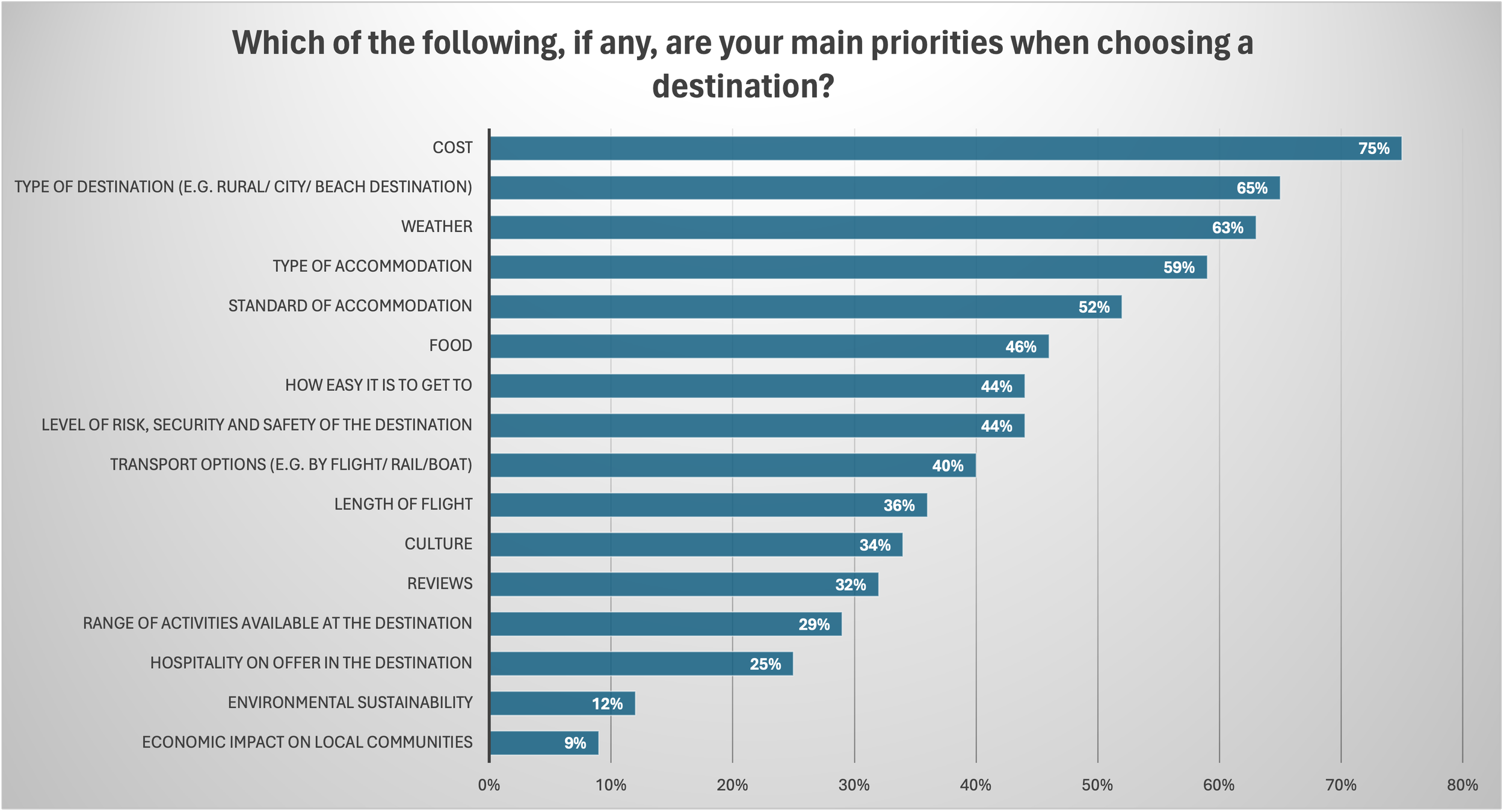Travel Behaviours Risk Index
How your Holiday Head
can get you into trouble…
…and what you can do about it
What is the
Travel Behaviours
Risk Index?
There are plenty of studies that explore the role safety plays in selecting a travel destination or activity. But very little research has been done into the role that risk perception and risk behaviours play in the travel experience.
The Travel Behaviours Risk Index is a new measure of UK travellers’ risk perceptions and behaviours on holiday, based on a study of 2000 UK travellers conducted by OnePoll and travel incident data collected in partnership with Safer Tourism Pledge partners.
The top line
Ever tried something while travelling that you wouldn’t dream of doing if you were at home? Something that in hindsight you realised might have been foolish or reckless?
You’re not alone. You’ve simply experienced the ‘Holiday Head’.
Risk and safety considerations are an important part of traveller decision making, but our research shows that something else plays an important role as well - the ‘Holiday Head’. This is our propensity to behave in different ways on holiday than we would at home. It can be a really good thing, making us more open to new experiences, different tastes and diverse cultures on holiday. It helps make travel an enriching experience.
But it can also mean we leave common sense behind when it comes to risk-taking. Read on to find out more about the Travel Behaviours Risk Index and discover how the ‘Holiday Head’ manifests itself, including how we can spot it and what we can do about it.
How risk impacts destination choice
We asked travellers about their main priorities when selecting where to go on holiday. While risk and security levels clearly influence the decision (44%), it’s clear that other factors are much higher up on the list of decision-making criteria. Cost (76%), the type of destination (65%), weather (63%), accommodation standards (52%) and type (59%), and even food (46%) all rank higher than safety considerations when it comes to choosing a travel destination.
Most commonly reported health and safety incidents on holiday
While accidents and serious sickness on holiday tend to be rare, they do happen. Perhaps more often than most of us realise. Travellers report injuries and sickness that required medical attention, allergic reactions (to food and other allergens), near misses in and around the water, and even assaults. Even if it hasn’t happened to you, it can happen to someone you’re travelling with.
Taking sensible precautions, from paying attention to the effects of too much alcohol, to sticking together late at night if you’re travelling with others, and of course buying the right travel insurance to cover everything you’re doing, can help you avoid trouble and make things easier if something does go wrong for you.
A good traveller is always prepared
Many of us take precautions before we travel, from buying travel insurance (70%) to packing suitable clothing (67%), sunscreen (65%), first aid kits (39%) and any medicines we require (66%).
But far fewer take the time to research any kind of safety information about their destination (between 17% and 30%), and only one in eight travellers think about getting their fitness levels up in preparation for their holiday activities (15%). And just four percent of travellers, less than one in 20, would pack a portable carbon monoxide to take with them on their holiday.
How our ‘Holiday Head’ helps us be more open
The Travel Behaviours Risk Index reveals that 2 in 3 travellers (66%) are more open to new experiences and trying things they wouldn’t at home when they are on holiday. This is one of the great joys and positive outcomes of travel, allowing people to broaden their horizons, challenge their way of thinking, explore new cultures or even discover a new activity.
But there are potential pitfalls that can as a result of that openness - from engaging in higher-risk activities, like quad biking or parasailing, to going out at night alone or swimming in open water without checking the tides.
It’s important to be aware of the risks and remain vigilant.
How to handle your Holiday Head?
Don’t fight it – it’s part of what makes travel great!
But know how it affects you – what daft things have you done on previous holidays that you’d rather not repeat, or were lucky to come out of unscathed?
Ask yourself, and those you’re travelling with, “Would I do this at home?” - and if you wouldn’t because it’s not a very smart thing to do, pause and think about it for a moment.
Don’t be afraid to buck the trend locally… it’s ok to ask for a crash helmet even if it’s not the norm for the locals or other travellers.
It’s ok to be curious…asking your activity or accommodation provider about how they handle safety and risk management will give you confidence in them.
Stay safe to keep your holiday happy
Check out our travel tips and guidance on everything from accommodation safety, tips for staying safe while travelling solo, advice for travellers with allergies and holidaying in tropical climates.










